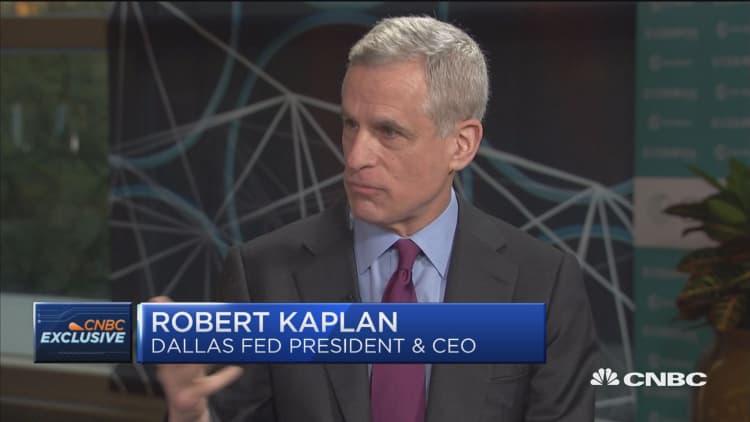
Raising interest rates now gives the U.S. the best chance to keep pushing the economy forward, Dallas Fed President Robert Kaplan said Tuesday.
In that light, Kaplan said he favors three rate hikes this year, a sentiment reflected in markets that nevertheless have been wary that the central bank may get more aggressive should the improving economy start generating more noticeable inflation.
"It's three for this year. I think we should get started sooner rather than later, though," he said during an interview on CNBC's "Squawk Box."
A March rate hike is nearly a certainty judging by trading in the fed funds futures market. A subsequent hike is expected in June, with a third likely coming in September, according to the CME's FedWatch tracker.
Whether the Fed goes for a fourth move is still in doubt, though it currently has about a 1 in 3 shot. Fears of a more aggressive central bank have helped roil a market that had been showing an extraordinarily low level of volatility prior to 2018.
In Kaplan's view, consistent hikes are necessary especially with the unemployment rate at 4.1 percent, which he and other Fed officials consider to be right around full employment, or the point where nearly everyone looking for a job has one.
"We think the unemployment rate is going into the 3s during 2018. ... We are either at or below full employment right now," he said. "On the bright side, it means more people will have jobs. It should lead to some pressure."
"But the thing I'll be watching is the history of overshooting full employment in the United States and having a soft landing is not a long history. So the reason I want to start removing accommodation, raising the fed funds rate, is I think that will give us the best chance to extend this expansion for longer."
On another issue, Kaplan said President Donald Trump's plans, announced last week, to slap tariffs on imported steel and aluminum "could have some chilling effect" on trade relations with Mexico and Canada. Trump has said that he might back off on the tariffs if the nation's NAFTA partners provide some U.S.-friendly concessions on the pact that took effect in 1994.
"It's so clearly in the interests of the United States to have strong trading relationships with both those countries. I'd be optimistic about how this actually gets implemented," Kaplan said.


